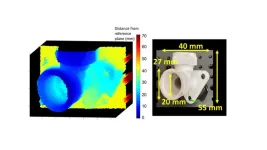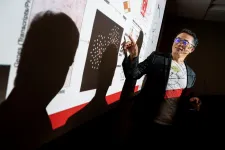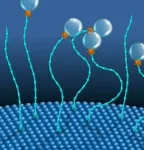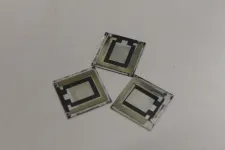(Press-News.org) Hugging and swaddling opioid-exposed newborns can reduce their hospital stays by almost a week, compared to older, drug-based methods, according to new research published by University of New Mexico researchers.
For years, clinicians have known that babies exposed to opioids in the womb were at risk of developing neonatal opioid withdrawal syndrome (NOWS), distressing them to the point of excessive crying, tremors and, in severe cases, even seizures.
Hospitals have used widely different approaches to care and, until now, the understanding of long-term consequences of administering opioid-withdrawal medications to infants has been limited.
“These findings will be filling a huge gap,” said Jessie Maxwell, MD, an associate professor in the UNM Department of Pediatrics Division of Neonatology. “Opioid use is an epidemic across the country, and in New Mexico we now have a large population of pregnant individuals who use opioids of various types, resulting in the exposure to infants.
“With this study, we’re finally going to be able to create standardization of care for assessment following birth in this high-risk population.”
In a study published April 30 in The New England Journal of Medicine, a team of researchers found that the “Eat, Sleep, Console (ESC)” care approach was more effective than subjective scoring approaches for treating opioid-exposed infants.
“This study is the first time that we’re coming together nationally to be able to figure out the best care approach for these infants,” Maxwell said.
Hospitals typically evaluate newborns with NOWS using a rigorous assessment called the Finnegan Neonatal Abstinence Scoring Tool (FNAST), which rates symptoms of opioid withdrawal in more than 20 areas.
Researchers have raised concerns about the tool’s subjectivity and overestimation of the need for opioid-withdrawal medication, including methadone and morphine. “FNAST doesn’t allow for wiggle room and clinical judgement, and so clinicians would often start pharmacologic treatment as soon as that critical limit was hit,” Maxwell said.
Alternatively, she said, the ESC approach to care provides a function-based assessment of withdrawal severity centered around how well an infant can eat, sleep and be consoled. ESC then prioritizes family-centered care, including increased family presence, bonding, holding, swaddling and rocking in low-stimulus environments, as first-line treatment.
“The difference with this approach compared to FNAST is that it tries to optimize the non-pharmacological interventions as much as we possibly can,” Maxwell said. “We focus on having the baby swaddled, mom holding the baby and being really involved with care.”
If the newborn is not able to eat, sleep or be consoled, only then will medication be administered, weaning the infant from the opioid dependency.
“We want to do all possible interventions to minimize any issues with the baby before opting for medication,” she added.
The National Institutes of Health-funded study followed 1,305 infants across 26 U.S. hospitals, including UNM Hospital. It found that newborns cared for with the ESC approach were medically ready for discharge approximately 6.7 days earlier and were 63% less likely to receive drug therapy, compared to newborns cared for under the FNAST approach. Safety outcomes at three months were similar between both groups.
“This means we can decrease the length of stay at the hospital and we can decrease the amount of exposure to pharmacological treatment,” Maxwell said.
She added that lowering the need for medication intervention will also reduce the high prevalence of transporting those infants to major centers, as smaller hospitals don’t typically have the capability to provide opioid-withdrawal drugs to newborns.
“Instead, with the ESC approach, the babies can stay in their community with their family, which is so important for bonding,” Maxwell said. “As we get these results, we want to be able to disseminate this information across the state, so we can be sure that infants born in more rural areas can get the best medical care possible.”
A two-year follow-up study of a subset of the infants is ongoing. This follow-up is critical to further inform the safety of the ESC care approach, Maxwell said.
“That’s a major piece we don’t have to this puzzle right now,” she added. “It’s critically important to get more information about development so we can better support this population.”
UNM’s portion of the study was a collaboration between the IDeA State Pediatric Clinical Trial Network (principal investigators: Hengameh Raissy, PharmD, and Alberta Kong, MD, MPH) and the Neonatology Research Network (PI: Janell Fuller). The nationwide clinical trial was funded by the Helping to End Addiction Long-term Initiative. Maxwell was the study site PI for New Mexico.
Maxwell thanked UNM collaborators who helped with the study: Larry Leeman, MD, MPH, and Katie McCalmont MD, in the Department of Family & Community Medicine, Heather Pratt-Chavez, MD, Sofia Markee, DO, and Nicole Urrea, MD, in the Department of Pediatrics, Samantha Schmaltz, RN, mother-baby unit nursing director at UNM Hospital, nursing educators Dana Condrey, RN, and Lindsey Hall, RN, and Maribeth Thornton, UNM Hospital’s associate chief nursing officer.
“They all supported this initiative and helped get it off the ground,” Maxwell said. “It was a huge, huge lift, so we certainly want to acknowledge them.”
The study’s results were briefly presented April 18 at a UNM alumni event in Washington, D.C. Its impact was “appreciated by the congressional delegation,” said Raissy, who also serves as interim Vice President of Research, Health Sciences.
“The next step is implementation and dissemination of ESC in the other hospitals in New Mexico,” Raissy said. “We could not be more pleased with the result and its impact. This is the result of a great team effort and collaboration at UNM and nationally. We are looking forward to the next steps.”
END
Swaddles, hugs > withdrawal drugs
UNM clinical trial identifies best care practices for opioid-exposed newborns
2023-05-04
ELSE PRESS RELEASES FROM THIS DATE:
Lurie Children’s Hospital first in Illinois to be designated as a Rare Disease Center of Excellence by National Organization for Rare Disorders (NORD)
2023-05-04
Ann & Robert H. Lurie Children’s Hospital of Chicago is the first in Illinois to receive designation as a NORD Rare Disease Center of Excellence, becoming one of 40 U.S. academic medical centers selected to be a part of the first-of-it-kind national network of U.S. medical institutions dedicated to diagnosing, treating, and researching all rare diseases. The network is led by the National Organization for Rare Disorders (NORD) and is designed to foster knowledge sharing between rare disease experts across the country to help meet the unmet needs of more than 25 million ...
Quantum lidar prototype acquires real-time 3D images while fully submerged underwater
2023-05-04
WASHINGTON — For the first time, researchers have demonstrated a prototype lidar system that uses quantum detection technology to acquire 3D images while submerged underwater. The high sensitivity of this system could allow it to capture detailed information even in extremely low-light conditions found underwater.
“This technology could be useful for a wide range of applications,” said research team member Aurora Maccarone, a Royal Academy of Engineering research fellow from Heriot-Watt University in the United Kingdom. “For example, it could be used to inspect underwater installations, such as underwater wind farm cables and the submerged ...
American Geriatrics Society welcomes Donna M. Fick, PhD, GCNS-BC, AGSF, FGSA, FAAN As New President At 2023 Annual Scientific Meeting
2023-05-04
New York (May 3, 2022) — Donna M. Fick, PhD, GCNS-BC, AGSF, FGSA, FAAN will step into the role of President of the American Geriatrics Society (AGS) at the 2023 AGS Annual Scientific meeting which is taking place May 4-6, 2023 (pre-conference day is May 3). An AGS member since 1999 and a member of its Board since 2015, Dr. Fick is committed to working with AGS leaders and members to improve the health, independence, and quality of life of all older people.
“I have always appreciated AGS’ focus, support and advancement of an interprofessional team approach that puts older adults and caregivers at the center, embraces the best evidence ...
Investment in Ontario drug discovery research will help develop new cancer medicines for patients
2023-05-04
May 4, 2023, TORONTO – Ontario research teams investigating new ways to treat cancer are taking the crucial next steps to bring their discoveries to patients thanks to support from the Ontario Institute for Cancer Research (OICR).
OICR announced it is funding five Ontario-based drug discovery projects between $150,000 and $300,000 per project through its Cancer Therapeutics Innovation Pipeline (CTIP) initiative. CTIP supports research into promising molecules that could become the next generation of cancer therapeutics.
This year’s cohort of CTIP projects aims to develop treatments for some of the most devastating cancers, including pancreatic cancer, ovarian cancer, breast cancer ...
Machine learning can support urban planning for energy use
2023-05-04
As Philadelphia strives to meet greenhouse gas emissions goals established in its 2050 Plan, a better understanding of how zoning can play a role in managing building energy use could set the city up for success. Researchers in Drexel University’s College of Engineering are hoping a machine learning model they’ve developed can support these efforts by helping to predict how energy consumption will change as neighborhoods evolve.
In 2017, the city set a goal of becoming carbon neutral by 2050, led in large part by a reduction in greenhouse gas emissions from building energy use – which ...
University of Toronto researchers use generative AI to design novel proteins
2023-05-04
Researchers at the University of Toronto have developed an artificial intelligence system that can create proteins not found in nature using generative diffusion, the same technology behind popular image-creation platforms such as DALL-E and Midjourney.
The system will help advance the field of generative biology, which promises to speed drug development by making the design and testing of entirely new therapeutic proteins more efficient and flexible.
“Our model learns from image representations to generate fully new proteins, at a very high rate,” says Philip ...
St. Jude tool gets more out of multi-omics data
2023-05-04
(MEMPHIS, Tenn. – May 04, 2023) Despite the astounding advances made in understanding the biologic underpinnings of cancer, many cancers are missing obvious genetic drivers. When scientists can’t pinpoint the factors that drive cancer, treating it can be much more difficult. Scientists at St. Jude Children’s Research Hospital hope to solve that problem with an updated way to analyze multi-omic (primarily transcriptomics and proteomics) data. The researchers created a next-generation computational tool to gain new insights from biological data ...
Alternative fuel for string-shaped motors in cells
2023-05-04
Cells have a fascinating feature to neatly organize their interior by using tiny protein machines called molecular motors that generate directed movements. Most of them use a common type of fuel, a kind of chemical energy, called ATP to operate. Now researchers from the Max Planck Institute of Molecular Cell Biology and Genetics (MPI-CBG), the Cluster of Excellence Physics of Life (PoL) and the Biotechnology Center (BIOTEC) of the TU Dresden in Dresden, Germany, and the National Centre for Biological Sciences (NCBS) in Bangalore, India, discovered a novel molecular system that uses an alternative chemical energy and employs a novel mechanism ...
How seaweed has been misleading scientists about reef health
2023-05-04
For decades, scientists have looked to seaweed as an indicator of the health of coral reefs lying underneath.
But what if the seaweed was misleading them?
New UBC research reveals it was, and scientists need new ways to determine whether human activity is harming a particular reef.
"This is especially critical today, given that reefs globally are threatened by climate-driven stressors,” said Dr. Sara Cannon, a postdoctoral fellow at the UBC Institute for the Oceans and Fisheries and the study's lead author.
Local species ...
CityU researchers develop an additive to efficiently improve the efficiency and stability of perovskite solar cells
2023-05-04
Perovskite solar cells (PVSCs) are a promising alternative to traditional silicon-based solar cells because of their high power-conversion efficiency and low cost. However, one of the major challenges in their development has been achieving long-term stability. Recently, a research team from City University of Hong Kong (CityU) made a breakthrough by developing an innovative multifunctional and non-volatile additive which can improve the efficiency and stability of perovskite solar cells by modulating perovskite film growth. This simple and effective strategy has great potential for facilitating the commercialisation of PVSCs.
“This type of multifunctional ...
LAST 30 PRESS RELEASES:
Fossil amber reveals the secret lives of Cretaceous ants
Predicting extreme rainfall through novel spatial modeling
The Lancet: First-ever in-utero stem cell therapy for fetal spina bifida repair is safe, study finds
Nanoplastics can interact with Salmonella to affect food safety, study shows
Eric Moore, M.D., elected to Mayo Clinic Board of Trustees
NYU named “research powerhouse” in new analysis
New polymer materials may offer breakthrough solution for hard-to-remove PFAS in water
Biochar can either curb or boost greenhouse gas emissions depending on soil conditions, new study finds
Nanobiochar emerges as a next generation solution for cleaner water, healthier soils, and resilient ecosystems
Study finds more parents saying ‘No’ to vitamin K, putting babies’ brains at risk
Scientists develop new gut health measure that tracks disease
Rice gene discovery could cut fertiliser use while protecting yields
Jumping ‘DNA parasites’ linked to early stages of tumour formation
Ultra-sensitive CAR T cells provide potential strategy to treat solid tumors
Early Neanderthal-Human interbreeding was strongly sex biased
North American bird declines are widespread and accelerating in agricultural hotspots
Researchers recommend strategies for improved genetic privacy legislation
How birds achieve sweet success
More sensitive cell therapy may be a HIT against solid cancers
Scientists map how aging reshapes cells across the entire mammalian body
Hotspots of accelerated bird decline linked to agricultural activity
How ancient attraction shaped the human genome
NJIT faculty named Senior Members of the National Academy of Inventors
App aids substance use recovery in vulnerable populations
College students nationwide received lifesaving education on sudden cardiac death
Oak Ridge National Laboratory launches the Next-Generation Data Centers Institute
Improved short-term sea level change predictions with better AI training
UAlbany researchers develop new laser technique to test mRNA-based therapeutics
New water-treatment system removes nitrogen, phosphorus from farm tile drainage
Major Canadian study finds strong link between cannabis, anxiety and depression
[Press-News.org] Swaddles, hugs > withdrawal drugsUNM clinical trial identifies best care practices for opioid-exposed newborns




